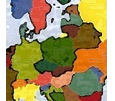 I get to chair an interesting seminar presentation from Prof Geoffrey Pridham of Bristol University at SSEES on post-accession ‘conditionality’, although as transpired from presentation and questions this might be better thought of as monitoring or transparency via a large number of different actors (European parliament, local media and NGOs, domestic oversight institutions set up to meet the acquis but now flexing their muscles, rather than the formal, bureaucratic oversight of the European Commission seen in the accession process. The big question is if (and how) the reforms (supposedly) enforced by the EU conditionality will unwind. The coming to power of the populist-nationalist government of Robert Fico in Slovakia and the similarly extremist backed minority coalition formed in Poland seemed a sign of such unravelling, although Geoffrey’s stress was on more on the culture, values and commitment of local elites than electoral politics. In this perspective generational turnover – indeed any kind of turnover of communist-era elites in the judiciary and elsewhere – is a key mechanism of change.
I get to chair an interesting seminar presentation from Prof Geoffrey Pridham of Bristol University at SSEES on post-accession ‘conditionality’, although as transpired from presentation and questions this might be better thought of as monitoring or transparency via a large number of different actors (European parliament, local media and NGOs, domestic oversight institutions set up to meet the acquis but now flexing their muscles, rather than the formal, bureaucratic oversight of the European Commission seen in the accession process. The big question is if (and how) the reforms (supposedly) enforced by the EU conditionality will unwind. The coming to power of the populist-nationalist government of Robert Fico in Slovakia and the similarly extremist backed minority coalition formed in Poland seemed a sign of such unravelling, although Geoffrey’s stress was on more on the culture, values and commitment of local elites than electoral politics. In this perspective generational turnover – indeed any kind of turnover of communist-era elites in the judiciary and elsewhere – is a key mechanism of change.Sketching out hypotheses for the fate of EU backed reforms (institutional inertia; path depednet-style lock-in; social learning; domestic pressures for rollback) he paints a mixed picture based on the experience of Slovakia and Latvia, where – according to much conventional academic wisdom - the pressures exerted by the EU during accession process displaced the illiberal democracy of Vladimír Mečiar and dampened down the inherent potential for ethno-national conflict in a society where some 30 per cent of the population is composed of Russophone minorities. For me the most interesting aspect of the talk was the way it filled the post-accession hiatus with some structured ideas and hypotheses about the EU-domestic politics relationship and, in particular, its view of elites and outcomes as more important than formal institutional building per se in the post-accession domestic arena. Here Geoffrey seems close to the ‘elite network state’ concept of Anton Steen, rather than the checklist of formal institutions set up to meet the acquis (used by Anna Gryzmala-Busse in her (admittedly differently focused) work on politicization of the post-communist state).
In truth, ‘euro-realists’ like Václav Klaus could be found arguing for the need to customize the acquis well before accession and questions have been asked as to whether conditionalitiy was in, fact, not a myth. Wade Jacoby’s innovative study of different policy sectors highlights the uneven nature of the acquis, conditionality and implementation and studies of regionalization - admittedly, a hot (well, warm) topic in the region before accession got going have stressed how the acquis was simply instrumentalized and/or potemkinized in ongoing domestic struggles. Here James Hughes, Gwendolyn Sasse and Claire Gordon's Europeanization and Regionalization in the EU's Enlargement to Central and Eastern Europe : the Myth of Conditionality (Basingstoke : Palgrave Macmillan, 2004) is well worth a shufti.
No comments:
Post a Comment